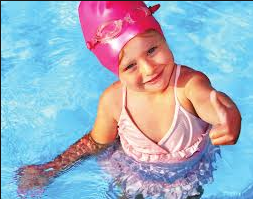This time of year, adults and children of all ages are looking for a cool place to escape the hot summer sun. The excitement of outdoor swimming areas, be it lakes, rivers, streams, oceans, or even pools, brings with it certain hazards. The key is to be aware of how well you know your environment and how carefully you pay attention to the changing conditions.
 Individuals should always exercise caution when visiting natural bodies of water because of the frequently changing currents and rip tides which can vary in strength. Be sure that you are aware of your surroundings as currents cause over 80 percent of surf rescues on the beach. Look for changes in the water such as dangerous waves which could be discolored, choppy, foamy, and may even contain dangerous debris. If you should find yourself caught in the changing tide or current, do not swim directly against the current as this will tire you out. Instead, swim diagonally against the current towards the shore.
Individuals should always exercise caution when visiting natural bodies of water because of the frequently changing currents and rip tides which can vary in strength. Be sure that you are aware of your surroundings as currents cause over 80 percent of surf rescues on the beach. Look for changes in the water such as dangerous waves which could be discolored, choppy, foamy, and may even contain dangerous debris. If you should find yourself caught in the changing tide or current, do not swim directly against the current as this will tire you out. Instead, swim diagonally against the current towards the shore.
It’s important to exercise extreme caution, always stay in designated swim areas and never swim alone. Always use the buddy system. If you are planning a trip to your local swimming hole, it’s always a good rule of thumb to be aware of the weather conditions and forecast. Strong winds, rain, and thunderstorms on the horizon can result in dangerous settings such as high water levels and strong currents.
Drowning is the second-leading cause of unintentional injury death among children ages 14 and younger and unfortunately there have been a number incidents in the Granite State in recent weeks. The main factors affecting drowning risks can be eliminated by insuring close supervision, wearing life jackets, and improving swimming abilities in both children and adults.
It takes as little as 20-60 seconds for a person to slip below the surface of the water. Drownings occur quickly and quietly in any body of water, even if a lifeguard is on duty. The importance of maintaining constant supervision when children are near the water can’t be stressed enough. Always stay within arm’s reach of young children, even in supervised areas, and avoid distractions – yes, that includes cell phones. That be ing said, children and adults that are inexperienced swimmers should always use U.S. Coast Guard approved life jackets when swimming and boating. Inflatable water toys such as pool noodles and water wings are not certified personal flotation devices (PFDs). It’s important to understand the difference between a PFD or life jacket and air filled toys such as water wings and noodles. These are not designed to replace life jackets and are not capable of keeping swimmers safe.
ing said, children and adults that are inexperienced swimmers should always use U.S. Coast Guard approved life jackets when swimming and boating. Inflatable water toys such as pool noodles and water wings are not certified personal flotation devices (PFDs). It’s important to understand the difference between a PFD or life jacket and air filled toys such as water wings and noodles. These are not designed to replace life jackets and are not capable of keeping swimmers safe.
The best way to help inexperienced swimmers be safer in the water is by helping them improve their swimming abilities. Research has shown that just by taking part in formal swimming lessons the risk of drowning among children ages 1 to 4 is drastically reduced. Water safety education and awareness is a staple component of all swim programs offered at The Granite YMCA. In addition to swimming lessons, the Y also hosts a variety of safety trainings each year including a comprehensive rigorous 40 hour lifeguard training and certification program and CPR and first aid classes.
Helping children and adults learn how to be safe around the water is a valuable life lesson. The Granite YMCA is committed to water safety and provides as many opportunities as possible for everyone to learn basic swimming skills and water safety practices. Children and adults of all ages are encouraged to take swim lessons—it’s never too late to learn!

Megan Hanson is the Aquatics Coordinator at the YMCA Allard Center of Goffstown, a branch of The Granite YMCA. She has been involved in aquatics since 1999 when she first started teaching swim lessons in the UK. In 2006, Meg began her career at The Granite YMCA where she holds certifications as a YMCA lifeguard instructor, swim lesson instructor, and CPR and first aid trainer.
For more information about aquatics programs at The Granite YMCA, please contact Megan Hanson at (603) 232-8680 or via email at meghanson@graniteymca.org.







